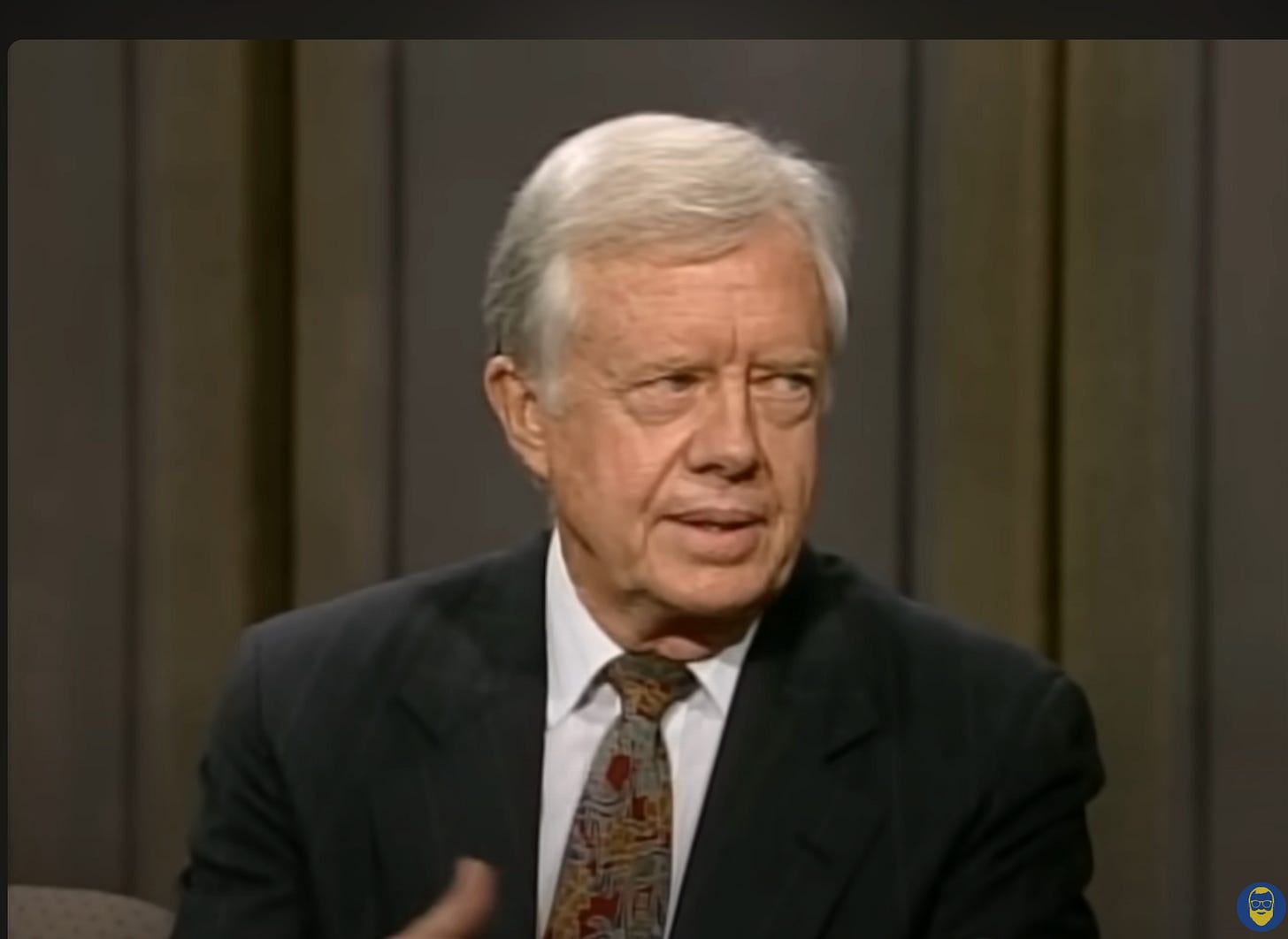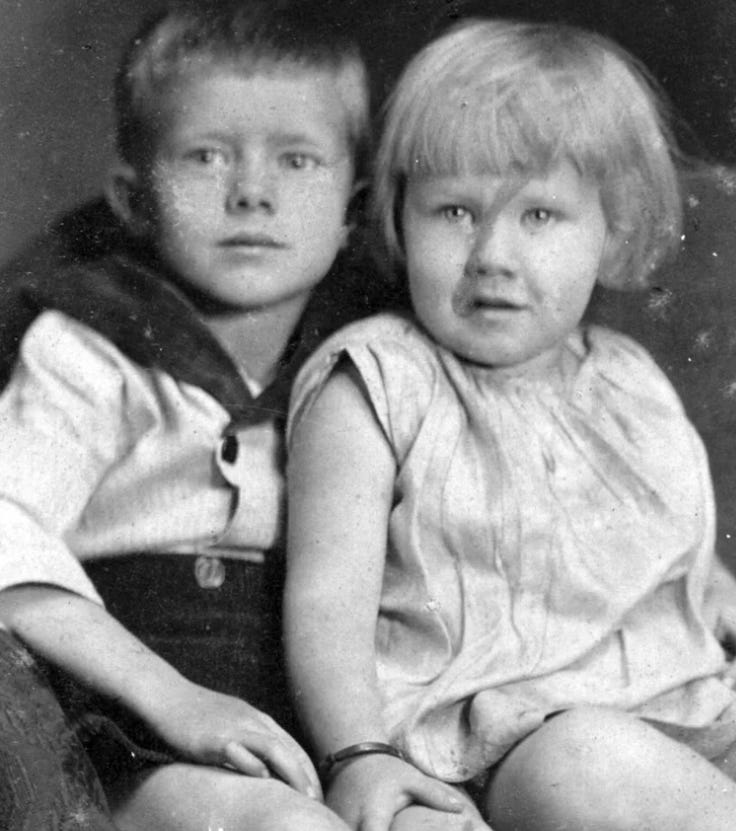Rest In Power, Jimmy Carter
The best of us has died at 100.

One of America’s finest presidents, in many ways the finest, number 39, Jimmy Carter, has died at 100 years old, the longest-lived president ever.
What a century he lived.
Imagine 1924. Calvin Coolidge was president, and the first president to broadcast on the radio. But Jimmy’s parents Lillian and James Senior couldn’t hear him on their peanut farm in Plains, Georgia, because Plains did not have electricity yet. Or indoor plumbing.
Prohibition was in effect, and the films were in black and white and silent, with piano accompaniment. News came from the local paper, which at the time — in Americus, Georgia, specifically, close by to Plains — was concerned with Valentino, “Japs,” boll weevils, and the condition of the cotton. (Heavy clouds had “pulled forth moisture,” but “The negrots are again in the field in many places, picking cotton and piling up the fleecy locks, ready for the jaws of the gin.” Yes, really.)
And also the heroism of aviators: Navy Lieutenant AJ Williams had just broken the world speed record at 243.68 miles per hour.
Jimmy's father owned a grocery store and a peanut farm, and Jimmy grew up to work on the farm, and sold produce in town. According to UVA historian Robert Strong, “by the age of thirteen, he bought five houses around Plains that the Great Depression had put on the market at rock-bottom prices.”
He graduated as valedictorian of his high school class, and inspired by World War II and an uncle in the navy, he applied to the Naval Academy in Annapolis and was admitted in 1943. He got to know his future wife, Rosalynn, during that time — well, they technically met much earlier, but that’s another story — and he graduated in three years as part of a wartime effort to replace officers who’d been dying in World War II. He became a Navy officer on a nuclear sub, and began working with the Naval Reactors Branch of the US Atomic Energy Commission in 1952, and was once sent in to clean up a spill at Canada's Chalk River nuclear research facility, which prevented a Canuck Chernobyl and gave him radioactive urine for months after the cleanup.
Then he got into politics, and rose from member of the Georgia State Senate to Governor of Georgia, and hired a wrongfully convicted murderer, Mary Price, as daughter Amy’s nanny, appointing himself as her parole officer. He was a longshot candidate for president, but defeated Gerald Ford in 1976, with a little help from the endorsements of senator Joe Biden, campaign worker Hillary Clinton, and benefit concerts from the Marshall Tucker Band and the Allman Brothers.
After the lies of Richard Nixon, the “I’ll never lie to you” of Carter was a balm. He said it, and by God, he meant it, even confessing to Playboy that he’d “looked on women in lust,” making for their most awkward interview until the John Mayer one.
As president he put his peanut farm in trust to avoid any appearance of impropriety, imagine that! He pardoned Vietnam draft-dodgers on his second day in office. He opposed segregation and appointed more minorities and women to judgeships than all previous presidents combined. He prioritized conservation, insisting his inaugural reviewing stand be made of steel, which was disassembled, shipped to Atlanta, and recycled as a bandstand. He had solar panels installed on the White House in 1979, which Ronald Reagan later had torn off, just to be an asshole.
He urged energy conservation in front of a fireplace in a mustard-colored sweater, and hoped the US to get 20 percent of its power from solar, which still hasn’t happened. He warned about climate change. He signed the Alaska National Interest Lands Conservation Act, and protected 157 million acres of land through the creation of national parks, refuges and conservation areas, the largest expansion of protected lands in history. And in 2017 he leased 10 acres of his land in Plains, Georgia, for a solar power project that still supplies half of the power to Plains.
He established the Department of Energy, and the Department of Education. He transferred the Panama Canal to Panama, a triumph of diplomacy that even John Wayne supported. Carter never got to appoint a Supreme Court justice, but he elevated Ruth Bader Ginsberg to the United States Court of Appeals for the DC Circuit.
He brokered peace between Egypt and Israel at the Camp David accords, and in 2002 won the Nobel Peace Prize “for his decades of untiring effort to find peaceful solutions to international conflicts, to advance democracy and human rights, and to promote economic and social development.”
He was defeated in 1980 by Reagan, after being dogged by gas shortages, inflation, unemployment and a 444-day Iranian hostage crisis, where an armed mob took 66 US diplomats and citizens hostage, with 52 of them held and tortured by the assahola Ayatollah Khomeini, who was demanding the return of the overthrown Shah for trial, and for Britain to hand over exiled prime minister Shapour Bakhtiar. Carter’s operation to rescue the hostages failed, and led to the deaths of eight service members, which Carter took responsibility for, because he was possibly too honest. The Iranian revolution also led to a drop in oil production, which made prices surge and led to those lines gas that you or your parents remember.
The Iranian hostages were formally released into US custody the day after the signing of the Algiers Accords, just minutes after American President Ronald Reagan was sworn into office, because Reagan promised to sell Iran weapons if they timed the hostage release just right.
Carter wrote in his diary, “dictators around the world are rejoicing because of the outcome of the election.”
After leaving the presidency, his work was just beginning. He founded the Carter Center in 1982 for “waging peace, fighting disease and building hope.” He led UN missions to oversee elections, representing the hope of the US. He helped raise the worldwide immunization rate from 20 to 80 percent by 1990, helped African farmers increase crop production, distributed 500 million doses of medication to combat neglected tropical diseases, and so many other things. And he almost totally eradicated the retchingly disgusting, nasty-ass guinea worm!
In between there, he hammered on Habitat for Humanity Houses, survived liver cancer, wrote 31 books, and he and Rosalynn were married for 77 years before she passed away in 2023. They had four children, Jack, Chip, Jeff and Amy, and 11 grandchildren, and 14 great-grandchildren.
And former President Jimmy Carter left one last parting gift for president-elect Donald Trump after his death: according to the US Department of Veterans Affairs, the American flag should fly at “half-staff for 30 days at all federal buildings, grounds, and naval vessels throughout the United States and its territories and possessions after the death of the president or a former president.” This means that on Trump’s inauguration all flags will be at half-staff in honor of the late president. As they should.
A cool fuckin’ guy, to the end, and beyond.
[Americus Times-Recorder / Military.com / Daily Beast / New York Times archive link]






I aspire to be even half as good a person as Jimmy Carter. He touched so many people in a positive way, never for self-glorification, always in service of humanity.
My favorite picture of my daughter is of Jimmy Carter holding my infant in his arms, both of them smiling with love.